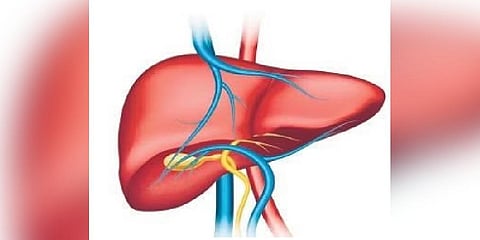Silent menace
HYDERABAD: The liver is a crucial organ in the human body, playing a vital role in various functions. One of its essential tasks is aiding in digestion and processing nutrients. It acts as a factory for the body, producing enzymes, hormones, and lipids, which are then released into the bloodstream to support various bodily processes.
Additionally, the liver is responsible for generating the energy that the body utilises. However, when the liver becomes inflamed, a condition known as hepatitis occurs.
This inflammation can lead to swelling and can significantly impact the liver’s proper functioning. The term “hepatitis” is derived from “hepa,” which refers to the liver. Consequently, it becomes essential to address and treat liver inflammation promptly to maintain overall health and well-being. As July 28 is observed as World Hepatitis Day, CE talks to experts to understand hepatitis, liver health, and the lifestyle for sustaining it.
Dr RV Raghavendra Rao, Gastroenterologist and Surgeon, Renova NIGL, talks about the theme WHO has set for this year, “Every year WHO observes this day to talk about liver affected problems, identifying them in early stage and availability of treatment. To bring awareness to all these aspects.
Every year they have a theme and this year’s theme is ‘We will not wait,’ that is we will not wait for hepatitis to destroy us.” He further talks about how the reasons for hepatitis differ from place to place, “When it comes to India, a developing country, most common reasons would be infections related.
Other reasons are also prevailing like smoking, and drinking but that is a different ball game altogether. The purpose of this day is to improve awareness, so focusing on common reasons makes sense, hence most of us talk about viral hepatitis. That doesn’t mean there is no other hepatitis in India, there is, like amoebic hepatitis, autoimmune hepatitis, but targeting preventable hepatitis i.e., viral is important.”
Discussing the common symptoms and types of Hepatitis, he elaborates, “There are types usually, water and food-borne which causes Hepatitis A and E, it is because of contaminated food and water, bad personal hygiene like not washing hands properly before eating food or post using the washroom.
Children are more prone to this type since they have less awareness about hygiene. Usually, hepatitis A and E are self-containing and self-limiting, body resistance and immunity will take care of it. Only 5% can cause serious trouble manifesting hospital admission. The common symptoms are stomach ache, jaundice, and in severe cases, blood vomiting and black stools. The other type is Hepatitis B and C, caused by the exchange of bodily fluids from person to person.”
According to Dr Rahul Dubbaka, Gastroenterologist, CARE Hospitals, “Hepatitis E is common in pregnant women and Hepatitis B can be contracted from mother to child. Upon screening and depending upon the viral load we accord the treatment. The child is given the vaccine, however, screening is mandatory for pregnant women for prevention.”
He further elaborates, “In general, using herbal medication or quack medication can cause hepatitis. Quitting smoking and alcohol helps. Incorporate fresh fruits that give antioxidants into your diet. Avoid contraceptive pills and antibiotics without supervision or advice,” concludes Dr Rahul.

